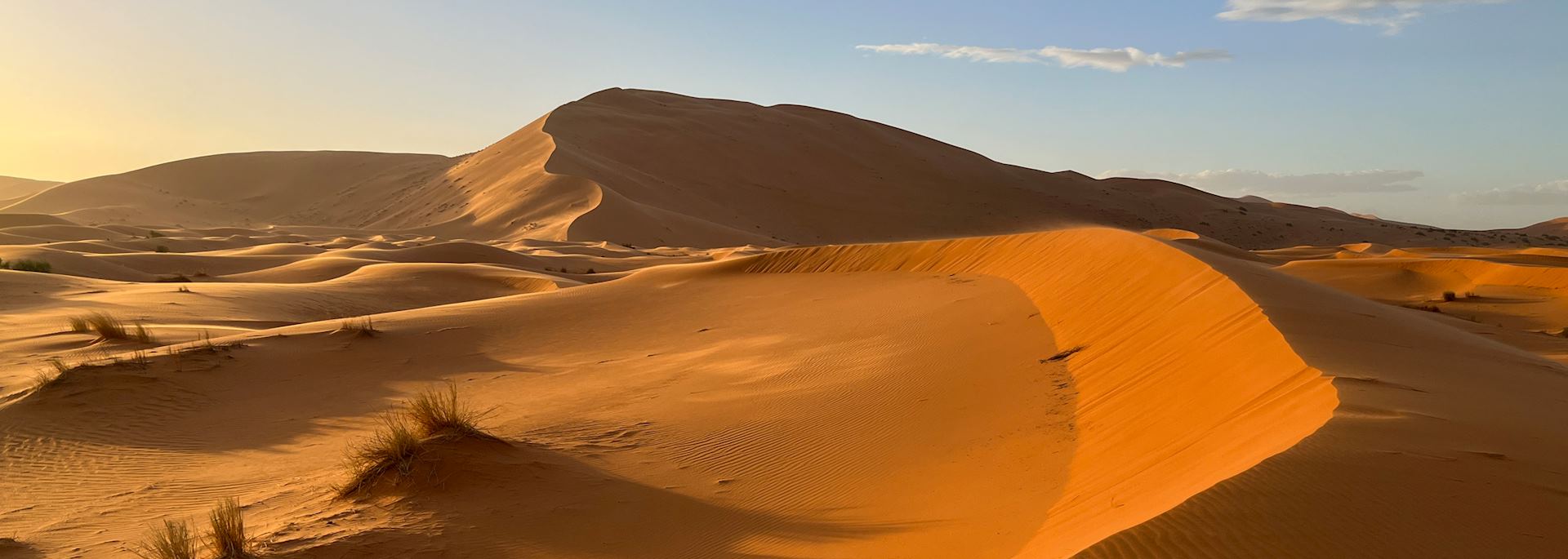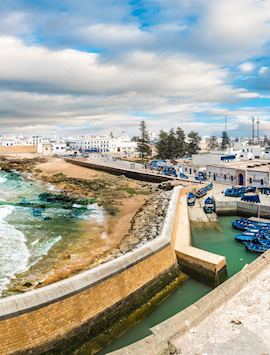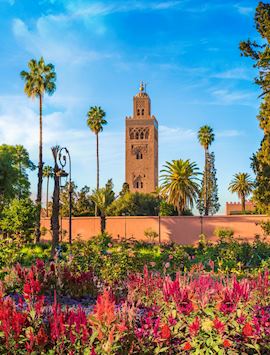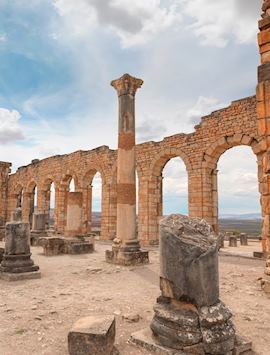By Morocco specialist Kerry-Ann
I called the city of Fez home for two years, during which time I rapidly fell under Morocco's spell. Honeymooning here, you'll have ample chances to relax, but Morocco is by no means a destination to just sit back and laze.
Its imperial cities are thrillingly boisterous and maze-like, where you're invited to haggle at any one of the myriad exotic stalls in the souqs. Away from this, the pace drops as you explore bohemian coastal towns, watch the sunrise over the towering dunes of the Sahara or discover traditional culture with the Amazigh communities in the High Atlas Mountains.
Explore Morocco's imperial cities

Morocco has four imperial cities: Marrakesh, Fez, Rabat and Meknes. The entry point into the country for many visitors, Marrakesh deserves a few days' exploration.
You can begin your honeymoon in Djemaa El Fna, the main square, where snake charmers and acrobats attract crowds by day, and in the evening the waft of spices and the cooking aromas of tagines from rows of brightly lit food stalls fill the air.
After tackling the maze of souqs in the medina, or old city, the Jardin Majorelle has a calming effect. A gift from Yves Saint Laurent to Marrakesh, it is a peaceful place to wander around with its cobalt buildings and tranquil gardens.
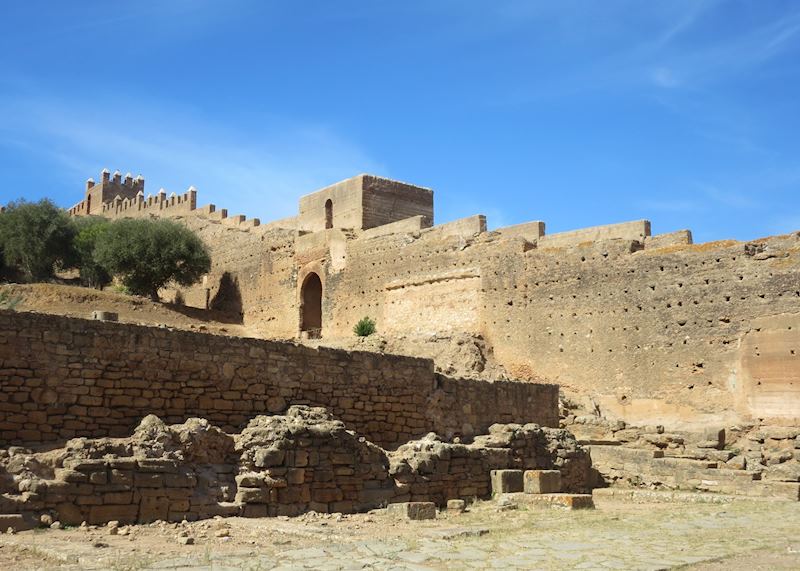
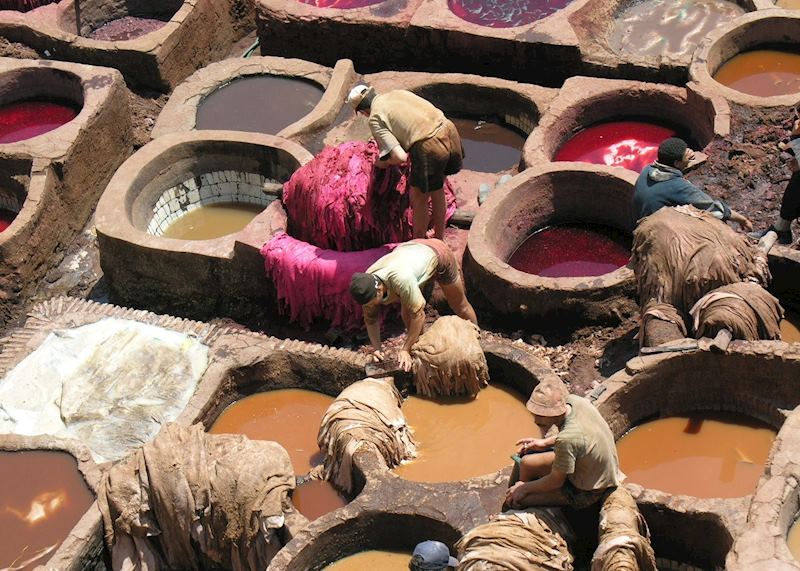
To experience a traditional medina away from the crowds, I recommend visiting Fez. Up in the north of the country, it's often the next stop after visiting the desert, a day's drive away. Here, the medina is a lot more intimate and less tourist-orientated than Marrakesh.
Fez is the largest car-free zone in the world, a network of over 9,000 unnamed streets that hide some fantastic riads (traditional Moroccan houses) where you can stay and hammams (Moroccan baths). It's an entertaining place to amble around under your own steam. You may well lose your way within the tangle of cobbled alleyways, but this is part of the fun.
Camp in the Sahara Desert

One experience I would definitely recommend for your honeymoon in Morocco is spending a few nights among the golden sand dunes of the Sahara Desert. Begin with a camel ride to a desert camp before watching the sands change in the setting sun from gold to orange then finally to a deep red.
In the evening, Amazigh musicians will entertain you with their playing, singing and sometimes dancing as you dine on classic Moroccan fare including goat or camel tagine, couscous and red wine.
For me, the beauty of the Sahara comes from the sense of remoteness and intimacy it instils. The dunes, which recede into the horizon in every direction, are beautiful at any time of day, but the star-laden night sky, far from any light pollution, is the best I've ever seen.
You're likely to share the camp with just two or three other couples. If you'd really like to push the boat out, you can hire it exclusively. The en-suite tents are decorated traditionally with Moroccan carpets and leather pouffes.
Experience the culture of the High Atlas Mountains

You can reach the clear mountain air of the High Atlas in just 45 minutes, driving from Marrakesh. The foothills, where forests of Aleppo pines meet salt mines, are a good place for walking. In particular, I love the Ourika Valley area: the red soil, olive groves and waterfalls provide the backdrop to various walking trails.
This is a region of Amazigh people, and you'll see the distinctive villages with their trademark mud brick architecture throughout the countryside. You'll see the distinctive villages with their trademark mud brick architecture throughout the countryside. I recommend visiting a house with your guide, where you can try Morocco's national drink of sweet mint tea with the family.
The house I visited in the Ourika Valley was open plan and only a couple of rooms were covered. The middle of the home was reserved for the family's cow and donkey. Some of the larger properties also contain large ovens for the family's daily bread baking.
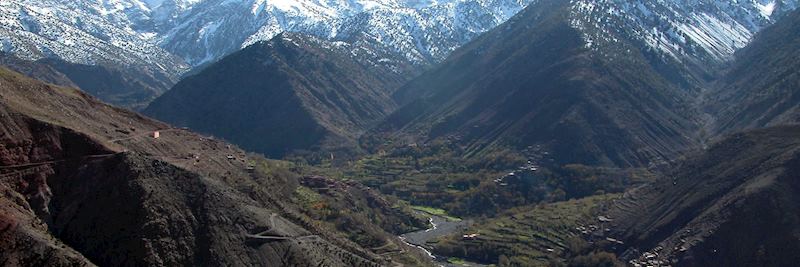
The snow topped mountains that surround Imlil village are particularly good for trekking, and it's from here you can ascend Mount Toubkal, the highest summit of the Atlas. You can also hire a guide who will show you saffron plantations and nectarine gardens, where orange flowers and roses are grown for Moroccan essential oils.
Go to a traditional hammam
Morocco's ancient bathing rituals are still very much alive today. Visiting a hammam (communal bathhouse) is a common part of life for many Moroccans who don't have their own facilities. Baths are communal, but men and women normally bathe separately. However, as staying guests, in a number of riads, couples can go into a hammam together.
This is a wonderfully relaxing experience where you're given a scrub made of crushed black olives to rub all over your body, before sitting in a hot steam room to sweat it out. Afterwards, your masseur scrubs you down and could, optionally, continue this very Moroccan practice with an essential oil massage.
Getting off the beaten track in Morocco

If you want to visit somewhere a little off the radar on your Morocco honeymoon, I'd recommend the town of Skoura. Around three and a half hours inland from Marrakesh, you'll travel through palm groves, date farms and the town of El-Kelaa M'Gouna, also known as the Valley of the Roses, en route. In springtime, El-Kelaa M’Gouna and the surrounding landscape is awash with roses. There are a number of cottage industry cooperatives where you can buy rosewater products, including sweets.
Skoura itself is home to a collection of kasbahs (fortresses) including Aït Benhaddou, a World Heritage Site and one of the best-preserved kasbahs in the country.
Another option is to visit Essaouira, a pretty and relaxed town on the Atlantic Coast with a bohemian atmosphere and large art and music scene. You'll hear live music playing in bars and on the streets in a town that has attracted the likes of Jimi Hendrix.
Many people assume Morocco is a dry country, but this isn't the case. There are some great cocktail bars in Essaouira, from where you can watch the sun set over the bay.
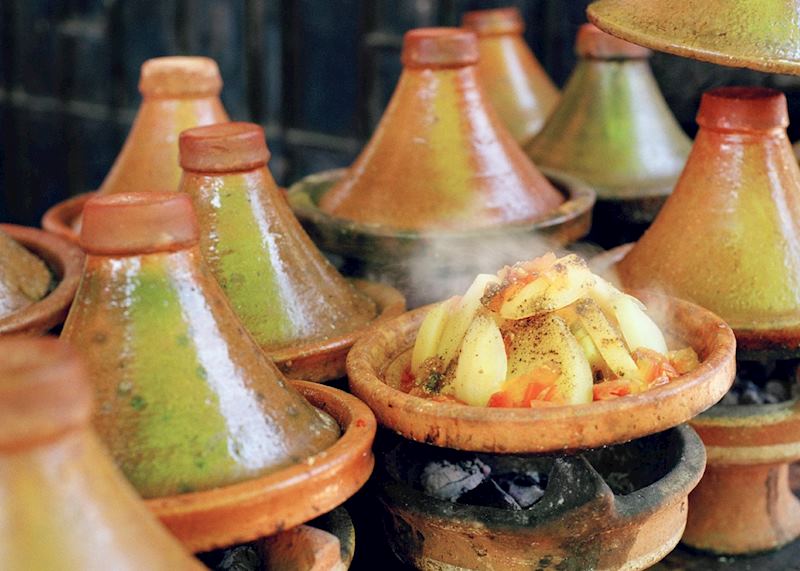
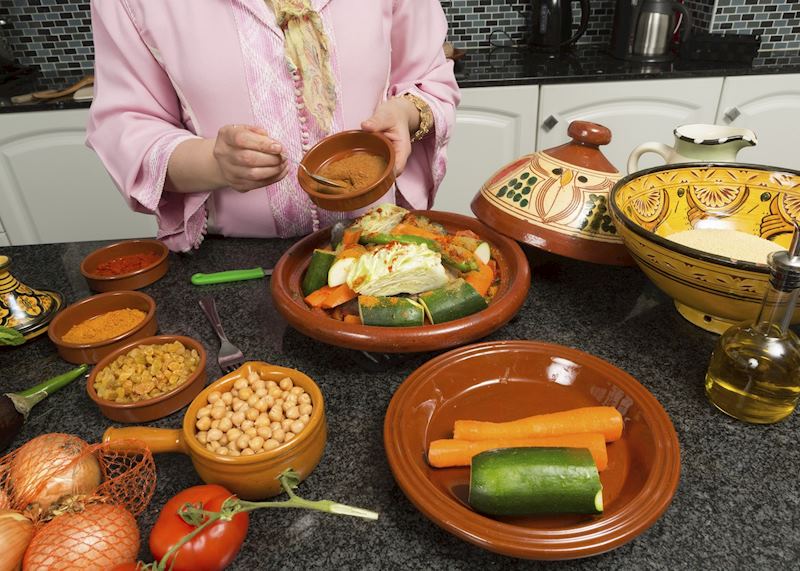
Indulge in Moroccan cuisine
I first tasted Tajine lham bel barkouk at a wedding when I lived in Morocco, and this tagine of beef or lamb features on most restaurant menus. The tender slow cooked meat is covered in a sauce made with soft onions and typical Moroccan spices, such as cinnamon and ginger. The best part, though, are the juicy prunes that sit on top, sprinkled with toasted almonds and sesame seeds — they just fall away from the pip. In this one dish you have what Moroccan cooking carries off so well: the blend of savoury and sweet.
Moroccan food is aromatic and delicious, and there are various culinary experiences you can incorporate into your honeymoon. Cooking lessons are available throughout the country, from learning how to make traditional pastries in an old almond warehouse in Essaouira to attending a class at the renowned La Maison Arabe in Marrakesh, which is taught by a traditional Moroccan cook, or dada.
You can also go on a tasting experience of Marrakesh or Fez with a guide. The food stalls of the medinas are extensive and can sometimes be a little overwhelming if you aren't sure of the dishes on offer, but your guide will be able to explain everything. You'll have the opportunity to sample local honeys and sweets and, if you're inclined, snail broth and goat's head soup.
Where to stay in Morocco
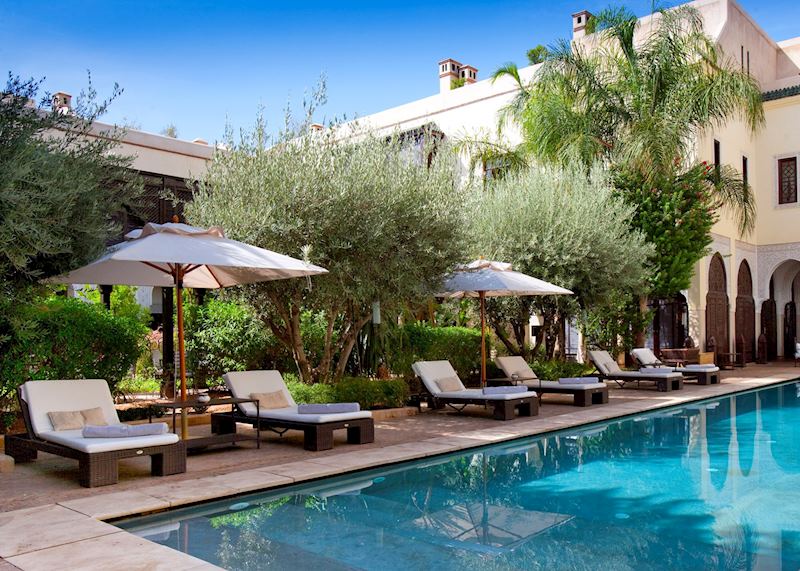
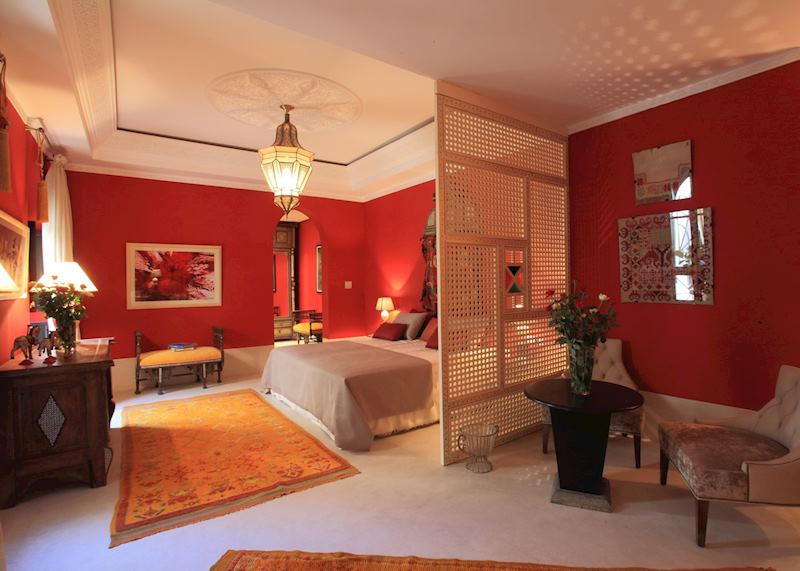
It’s almost impossible to visit Morocco and not include a riad in your stay. For me, riads are a hidden delight. Your first experience of one is likely to be as you step through a large, intricately carved cedarwood door on a cobbled backstreet, behind which lies an oasis in the city. You'll stand on the ornately tiled floor in a central courtyard, which all the rooms look onto, among orange trees and fountains.
Riads are tall buildings and many have roof terraces, from where you can look over the minarets and mosques of the city, and listen to the call to prayer.
In Marrakesh, Villa Des Orangers is one of the riads I often opt for. It contains a spa, rooftop and outdoor pool, and has lots of space.
For a more cost-effective option, Riad Palais Khum in the old town is a good choice. It's run by a couple of Italians and the decor mixes their heritage with Moroccan style. The riad also offers complimentary massages for honeymoon couples.
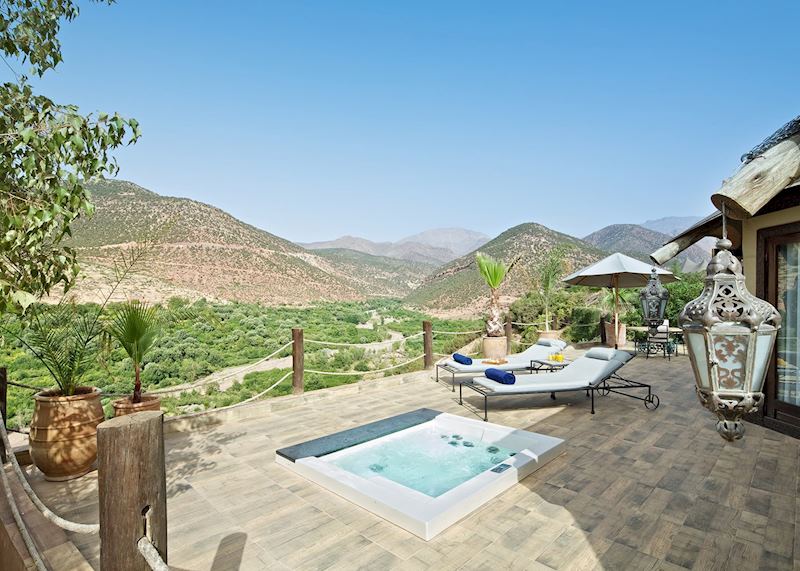
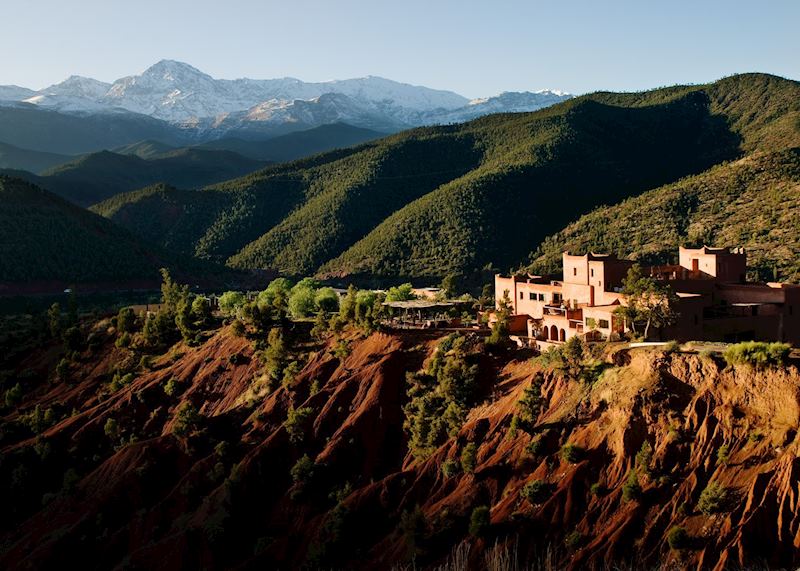
Kasbah Tamadot, owned by Sir Richard Branson, is one of the most luxurious options in the High Atlas Mountains. No expense has been spared to restore this beautiful building, and there is a real focus on sustainability. The indoor pool is heated by solar panels, and many of the ingredients used in the meals are sourced locally or grown in the kasbah's allotment.
On the edge of the Ourika National Park is Kasbah Bab Ourika. This is a converted kasbah within easy reach of saffron plantations and local Amazigh villages. It sits perched on the hilltop in command of the surrounding valley.
Best time to honeymoon in Morocco
Spring (April - May) and autumn (September - October) are the best time to visit Morocco. I recommend avoiding the height of summer when temperatures can soar.
Start planning your honeymoon to Morocco
Start thinking about your experience. These itineraries are simply suggestions for how you could enjoy some of the same experiences as our specialists. They're just for inspiration, because your trip will be created around your particular tastes.
View All Tours in Morocco
